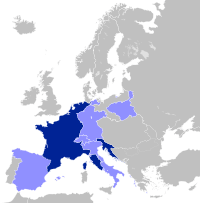Republic of Lucca
| Most Serene Republic of Lucca (en) | ||||||||||
| Serenissima Repubblica Lucense (it) Respublica Lucensis (la) | ||||||||||
| ||||||||||
| ||||||||||
 Northern Italy in 1796 | ||||||||||
| Capital | Lucca | |||||||||
| Languages | Italian | |||||||||
| Religion | Roman Catholic | |||||||||
| Government | Oligarchic republic | |||||||||
| Consuls of Justice | ||||||||||
| • | 1700 | Bartolomeo Conami | ||||||||
| • | 1799 | Nicolao Montecatini | ||||||||
| • | 1799 | Executive Directory | ||||||||
| • | 1805 | Francesco Belluomini | ||||||||
| History | ||||||||||
| • | Independence | 1160 | ||||||||
| • | Imperial immediacy | 1288 | ||||||||
| • | Pisan occupation | 1342–1368 | ||||||||
| • | French occupation | 4 February 1799 | ||||||||
| • | Austrian occupation | 17 July 1799 | ||||||||
| • | French occupation | 9 October 1800 | ||||||||
| • | Monarchy proclaimed; Duchy of Lucca | 23 June 1805 | ||||||||
| ||||||||||
The Republic of Lucca was a historic state of Italy, which lasted from 1160 to 1805 on the central Italian peninsula.
History
Medieval era
Within the Imperial Kingdom of Italy, the city of Lucca had been the residence of the Margraves of Tuscany. A certain autonomy was granted by a 1084 diploma issued by Emperor Henry IV, while on his Italian campaign during the Investiture Controversy with Pope Gregory VII. After the death of Margravine Matilda of Tuscany in 1115, the city began to constitute itself an independent commune, with a charter officially acknowledged by Margrave Welf VI in 1160. For almost 500 years, Lucca remained as an independent republic.
There were many minor provinces in the region between southern Liguria and northern Tuscany dominated by the Malaspina family. Tuscany in this time was a part of feudal Europe. The Divine Comedy by Dante includes many references to the great feudal families who had huge jurisdictions with administrative and judicial rights. Dante spent some of his exile in Lucca.
In 1273 and again in 1277 Lucca was ruled by a Guelph capitano del popolo (captain of the people) named Luchetto Gattilusio. In 1314, internal discord allowed Uguccione della Faggiuola of Pisa to make himself lord of Lucca.
- Castruccio Castracani
The Lucchesi expelled him two years later, and handed over the city to another condottiere Castruccio Castracani, under whose rule it became a leading state in central Italy. Lucca rivalled Florence until Castracani's death in 1328.
On 22 and 23 September 1325, in the battle of Altopascio, Castracani defeated Florence's Guelphs. For this he was nominated by Louis IV the Bavarian to become duke of Lucca. Castracani's tomb is in San Francesco in Lucca. His biography, by Machiavelli, is the author's third famous book on political rule.
Renaissance and onwards
Occupied by the troops of Louis of Bavaria, the city was sold to a rich Genoese, Gherardino Spinola, and then seized by John, King of Bohemia (1296-1346). Then pawned to the Rossi of Parma, and by them it was ceded to Martino della Scala of Verona. Then sold to the Florentines, surrendered to the Pisans (1342–1368), and then nominally liberated by the emperor Charles IV (son of John, King of Bohemia) and governed by his vicar.
In 1408, Lucca hosted the convocation intended to end the schism in the papacy. Lucca managed, at first as a democracy, and after 1628 as an oligarchy, to maintain its independence — alongside Venice and Genoa. It painted the word Libertas on its banners, until the French Revolution in 1789.[1] Lucca was the third largest Italian city state with a republican constitution ("comune") to remain independent over the centuries, as larger Venice and Genoa also did.
End
Early 19th century
- French democracy
The independent course of the Republic changed in February 1799, after the Second Coalition invasion (1799–1800), one of the Italian campaigns of the French Revolutionary Wars.
French Jacobins created a centralized republic, the State of Lucca, with a democratic constitution. The constitution granted the government to an Executive Directory, with a bicameral legislature composed of the Council of Juniors and the Council of Seniors. The democracy did not last long.
- Habsburg regency
Five months later in July 1799, after the French army retreated, forces of the Austrian Habsburg Monarchy conquered the city and established a Provisional government
- French republic restored
In late 1800 the French army returned, reconquering Lucca. A new constitution for the State of Lucca was published in 1801, restoring the office of Consul of Justice as the president of the Executive branch, with a parliament called the Great Council.
Napoleonic principality
In 1805, the governance of Lucca was taken over by Napoleon, who merging the State of Lucca with the Principality of Piombino to become the Principality of Lucca and Piombino (1805–1809). He put his favored sister Elisa Bonaparte Baciocchi in place to rule, his only female sibling to gain political power. Elisa began rule as the Duchess of Lucca and Princess of Piombino, based at Villa Reale di Marlia.
See also
- Duchy of Lucca — post-Napoleon (1815–1847)
- Grand Duchy of Tuscany — (1569-1801) and (1815–1859)
References
- ↑ Encyclopaedia Britannica 1911.
| Wikimedia Commons has media related to Republic of Lucca. |


